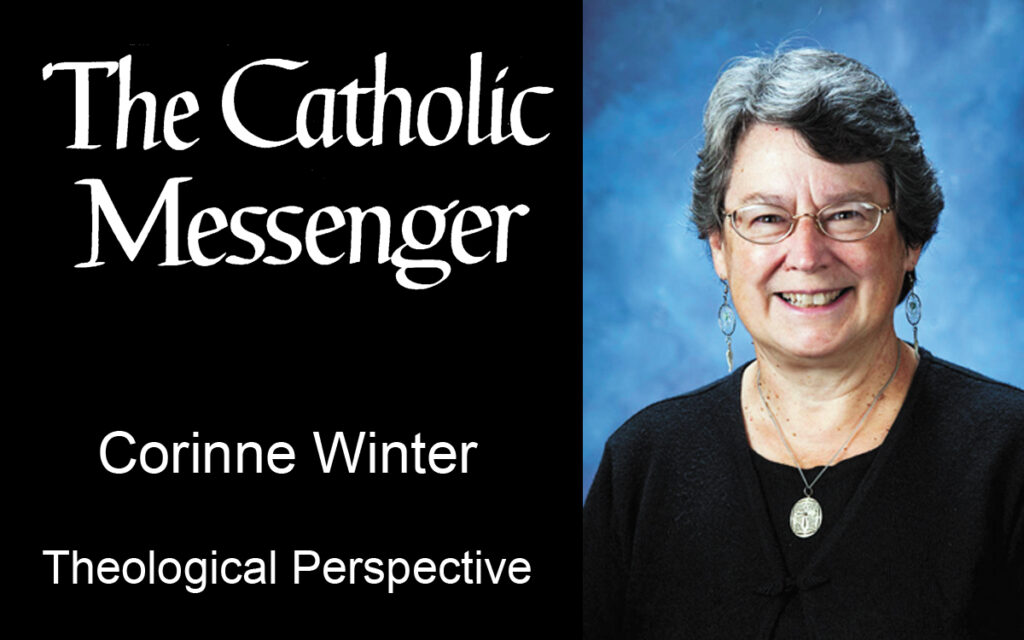By Corinne Winter
For many months, we have been longing for peace in our nation. Maybe it would come when the families of black people killed by police asked for calm. Maybe things would be calmer after the election, or when the election had been certified or…. At various points, at least the most flagrant physical violence died down. However, lack of physical conflict does not constitute peace. Peace cannot be established simply by quelling a riot, arresting perpetrators or setting armed guards to enforce the law, as important as those actions may be at a moment. True peace will be achieved, as Pope Paul VI exhorted us in 1972, only through the establishment of justice.
 That means we can’t make peace by sweeping under the rug any violations of human life, dignity and equality. We cannot make peace with unjustified killing, whether by abortion, by murder or by capital punishment. We can’t make peace with millions of people suffering homelessness, food insecurity or lack of opportunities for decent education or adequate employment. We can’t make peace by ignoring white supremacist and other racist declarations and actions that degrade other people. We must stand up against all forms of injustice while upholding the dignity of all persons involved.
That means we can’t make peace by sweeping under the rug any violations of human life, dignity and equality. We cannot make peace with unjustified killing, whether by abortion, by murder or by capital punishment. We can’t make peace with millions of people suffering homelessness, food insecurity or lack of opportunities for decent education or adequate employment. We can’t make peace by ignoring white supremacist and other racist declarations and actions that degrade other people. We must stand up against all forms of injustice while upholding the dignity of all persons involved.
The call to establish justice presents huge challenges from many sides. There are those who would insist that recognizing the dignity of persons includes accepting everything they think and do. However, justice demands that all people be called to recognize the truth and to act accordingly. As Catholics, we believe that truth is one, even as it may be expressed in diverse ways and people may be at different points in their quest for truth. We also recognize that truth is immense and that every person has a finite capacity. No one has a grasp of the whole truth; therefore, genuine respectful dialogue and study of the sources of truth are essential. Even when we see obvious error in a person’s or group’s way of thinking, we must resist the temptation to dismiss or to attach a derogatory label to them. We must proceed on the conviction that as creatures of God, they have a fundamental capacity to learn the truth and to act justly.
The conviction that all persons are created with the capacity to act rightly also means that those who speak and act against justice must be held accountable. Since we are made for goodness, we act against our own nature and against the creator of that nature when we speak and act unjustly. Such words and actions must be held up to the mirror of truth. Even when we fail to challenge injustice according to our ability and opportunity, we fail to be the persons we are created to be.
Words and actions have consequences and everyone must accept the consequences along with the responsibility for what she or he says and does. When some refuse to do so, consequences must be enforced from outside the person. Enforcement of consequences is not, however, the same as revenge. When one sees the harm another’s words or actions have on others, it can be very difficult not to want to seek a kind of retribution. We may feel an urge to see one who bullies others, destroys property, takes a life or spews racist slogans to experience the effects similar to those her or his actions have imposed on others. However, true justice restores community and psychologists attest that ultimately revenge does not bring inner peace to the avenger.
Catholic Tradition provides multitudes of sources for study and prayer as we face the enormous challenge of working toward a true peace founded on justice. In Scripture, we find the teachings of the prophets, of Jesus and of the early church. Theologians and members of the Magisterium addressed various social issues over the centuries. Works since the late 19th century are more easily located as the church has gathered them under the heading of “Catholic Social Teaching.” Many of us have read Pope Francis’ encyclical “Fratelli Tutti.” In that work and in other writings, Pope Francis builds on the work of his predecessors as he calls for individuals and nations to act in accord with human dignity.
Lent begins in the middle of the coming month. We may feel that the circumstances in which we live provide sufficient “penance.” However, perhaps the season calls us to find inspiration in the words and actions of those who in this and other troubled times have called attention to the need for justice.
(Corinne Winter is a professor-emerita of St. Ambrose University, Davenport.)











